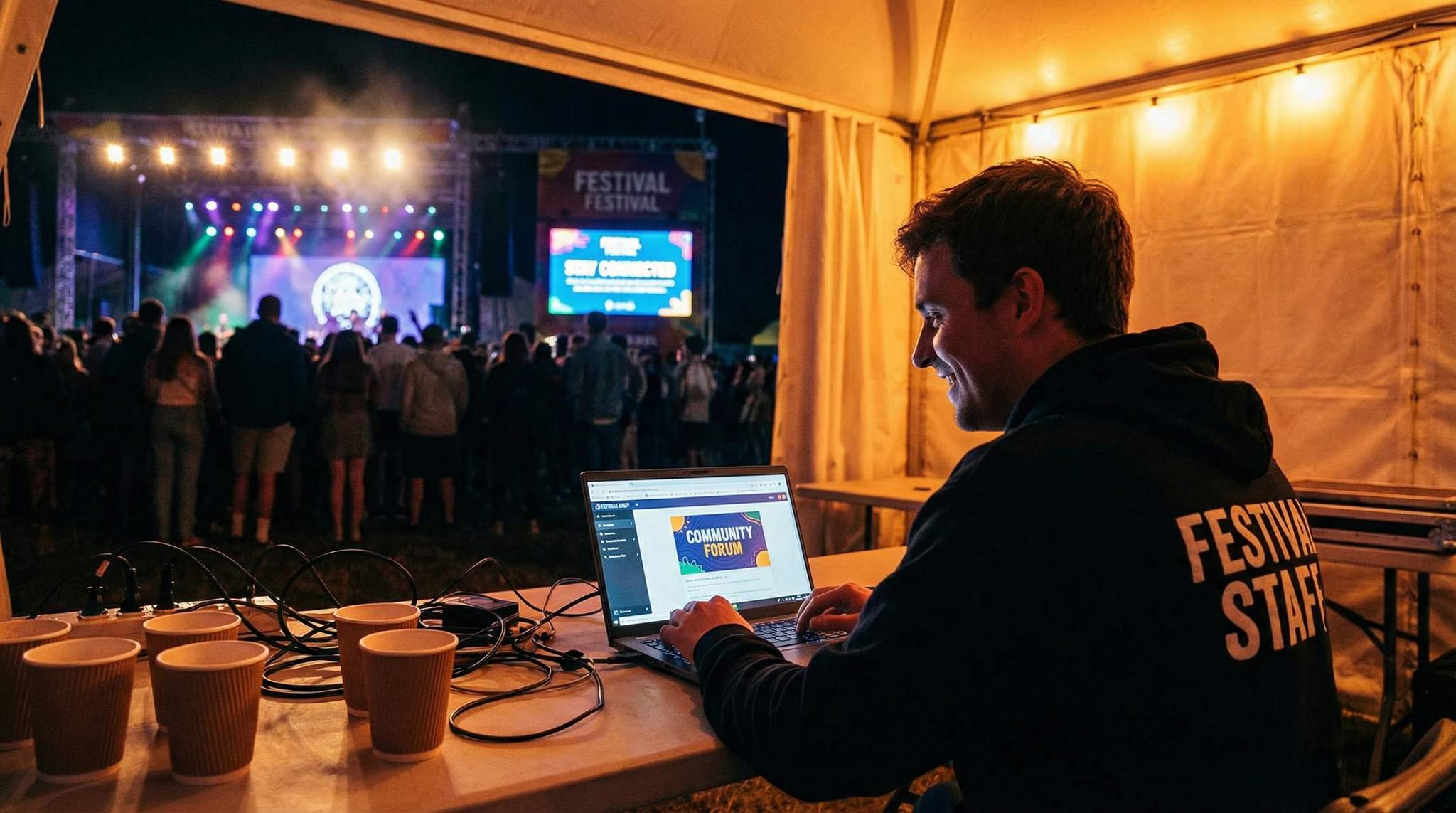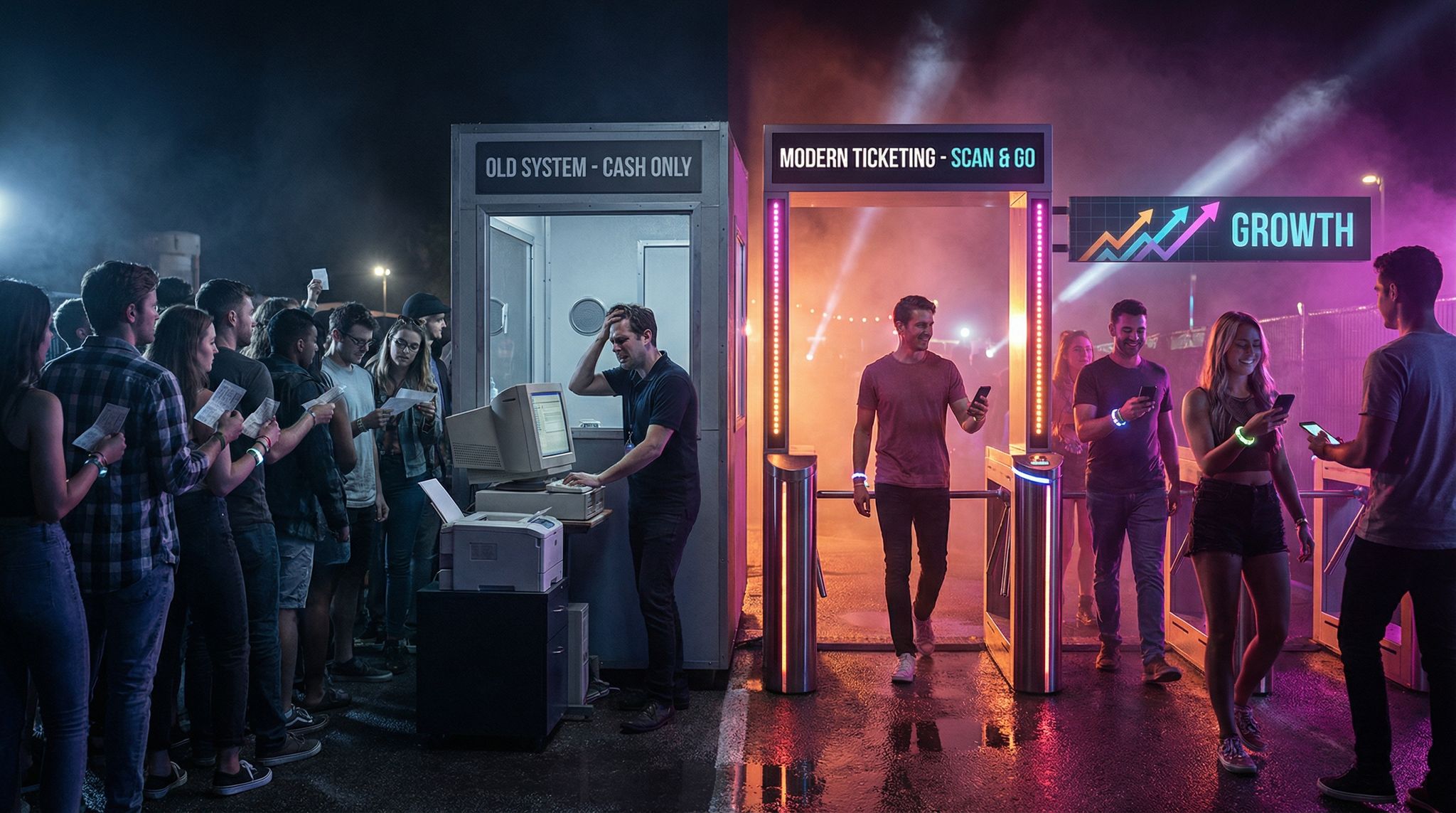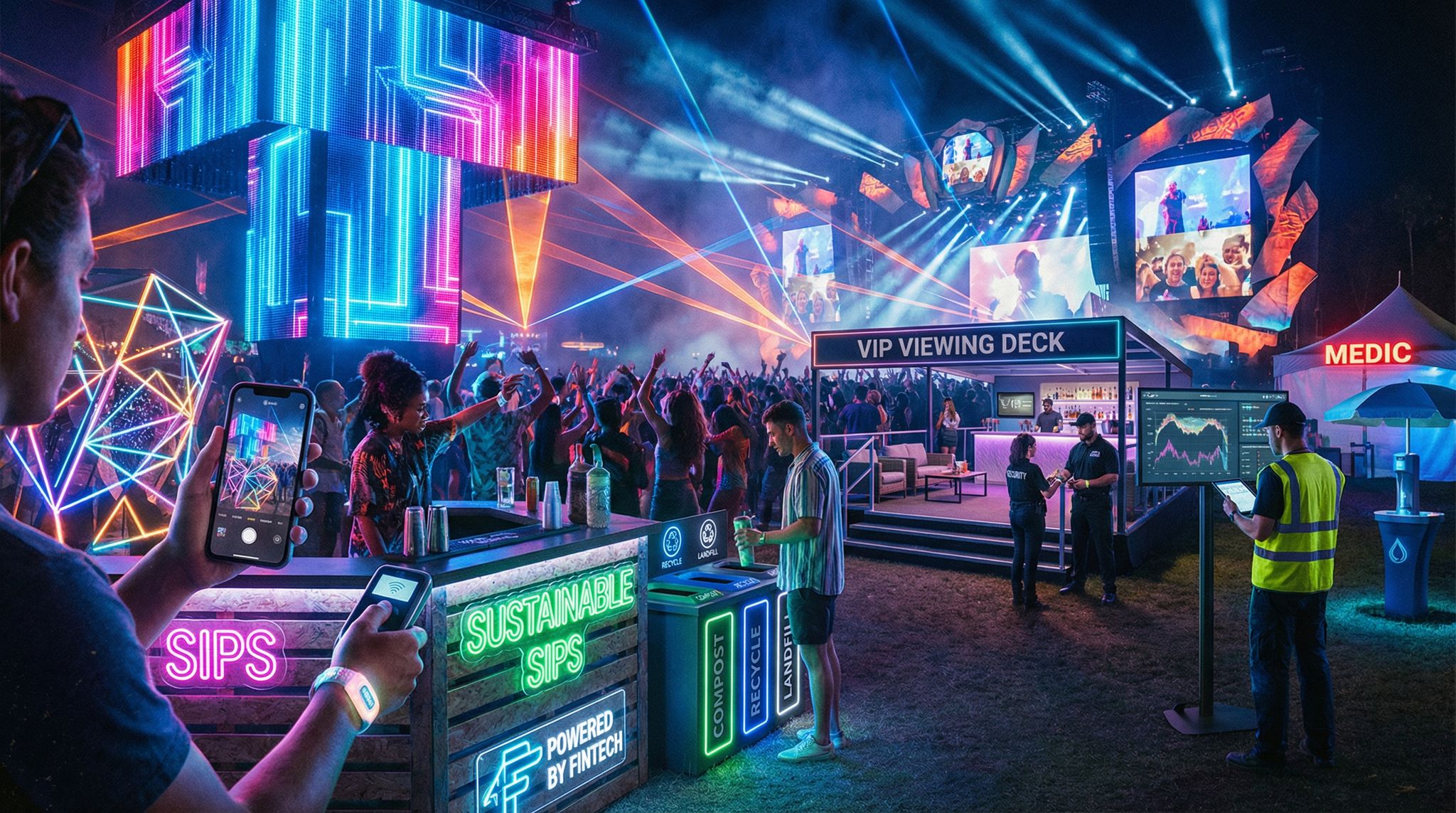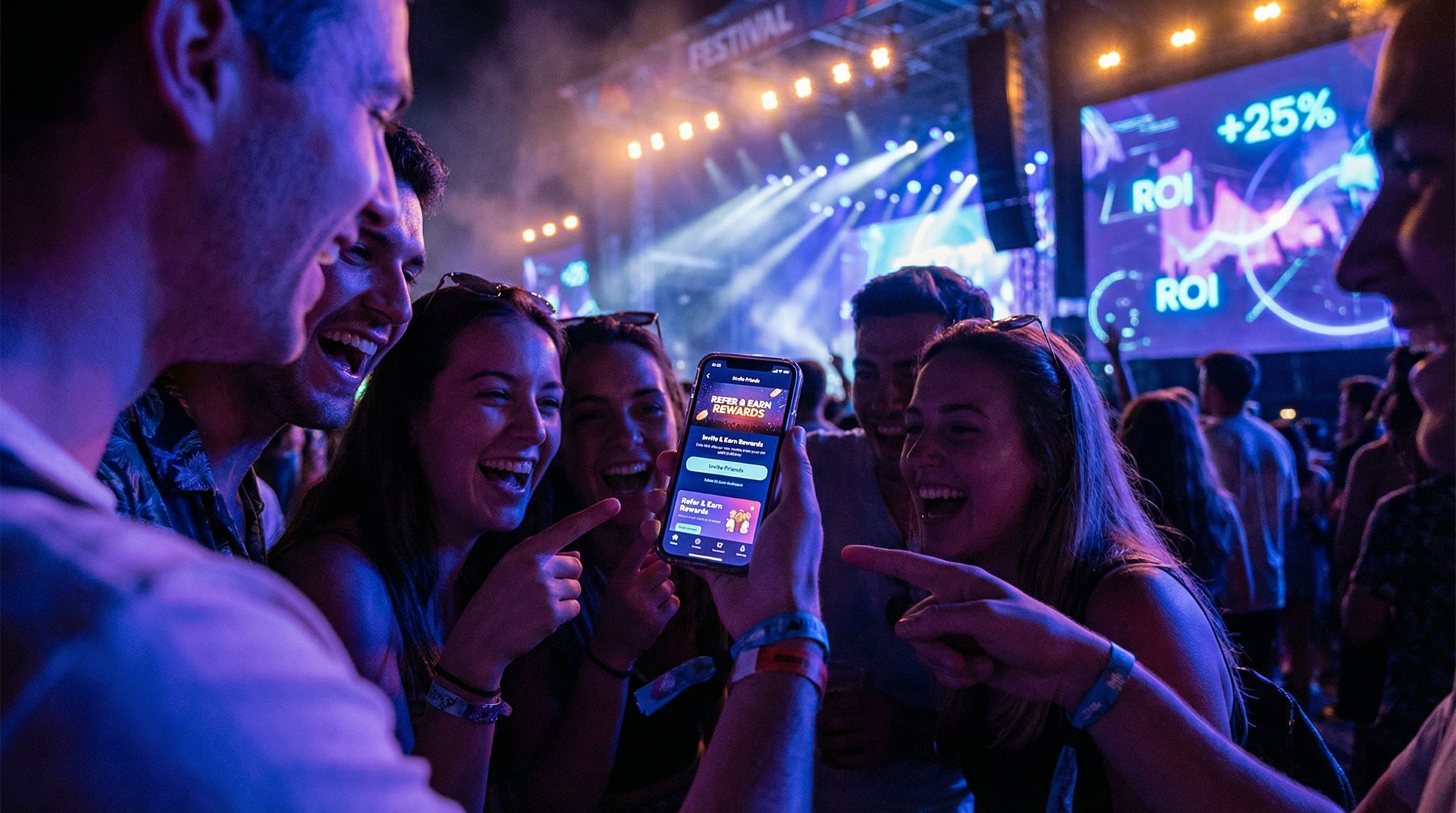Creating a festival fan community online is about extending the magic of your event beyond its dates – it’s a marketing superpower that keeps the excitement alive 365 days a year. When done right, an online fan hub turns one-time attendees into loyal advocates, amplifying word-of-mouth buzz. Festival producers around the world have found that maintaining year-round engagement strengthens loyalty and keeps their event top-of-mind – which in turn encourages fans to invite friends and fuels ticket sales through continuous engagement. In this guide, we’ll explore how to build and nurture a vibrant online community for your festival, covering platform choices, engagement strategies, and moderation best practices. The tone is mentorship meets practicality: consider these tips as wisdom from a seasoned festival organizer who has seen it all, from boutique food fairs to mega music extravaganzas.
Choosing the Right Platforms for Your Festival Community
Not all online platforms are created equal – the best choice depends on your audience and goals. Often, festival organizers opt for a mix of social media groups, forums, and chat platforms to cover different fan preferences:
-
Facebook Groups: Ideal for broad audiences and older demographics. Many festivals (from local art fairs to giants like Glastonbury) use Facebook Groups as an official gathering place for fans. These groups allow threaded discussions, easy sharing of photos/videos, and discoverability for casual followers. For example, the Glastonbury Festival has inspired multiple fan-run Facebook groups where attendees swap tips on camping and reminisce about past legendary performances. Official festival teams can create their own group (e.g. “Official [Festival Name] Community”) to share updates and engage directly. Facebook is ubiquitous, lowering the barrier to entry for most fans.
-
Discord Servers: Popular with younger, tech-savvy fans, Discord offers real-time chat organized into topic channels. Many music festivals have launched official Discord servers to build an always-on fan lounge. For instance, Coachella rolled out an official Discord community in 2022, giving the global Coachella “family” a place to connect beyond the two festival weekends. On Discord, you can create channels for various interests (lineup predictions, travel plans, aftermovie links, etc.) and even host live audio stages for Q&As or listening parties. European festivals are embracing Discord too – Tomorrowland fans congregate on unofficial Discord channels to share their excitement year-round, and the festival’s own media team interacts with them via One World Radio tie-ins. If your audience spans multiple countries and time zones (like Belgium’s Tomorrowland or Spain’s Primavera Sound), a Discord server can operate 24/7 to unite fans worldwide in one virtual campfire.
Turn Fans Into Your Marketing Team
Ticket Fairy's built-in referral rewards system incentivizes attendees to share your event, delivering 15-25% sales boosts and 30x ROI vs paid ads.
-
Dedicated Subreddits and Forums: Some communities thrive on Reddit or independent forums. Bonnaroo is a great example – its fan forum “Inforoo” (run by die-hard fans) has been buzzing year after year, where veterans guide first-timers and discuss every rumor and lineup clue. Smart festival organizers monitor these spaces and sometimes chime in to clarify info or acknowledge fan feedback. Creating an official subreddit for your festival, or a forum on your own website, can work if your fanbase is active there. Reddit communities often self-moderate with passionate fans enforcing etiquette, but having the festival’s presence (verified accounts or moderators) can ensure accurate information is shared. In the UK, the eFestivals online forums have long been gathering spots for fans of events like Glastonbury, Reading & Leeds, and more – showing that well before social media, forums helped sustain festival fan culture.
-
Messaging Apps and Regional Platforms: Don’t overlook platforms popular in specific regions. For example, festivals in Latin America or India might leverage WhatsApp or Telegram groups for their core community, given how prevalent these messaging apps are for group communication. In Asia, WeChat (China) or LINE (Japan, Thailand) could be channels to consider if you have a significant fanbase there. The key is to meet your fans where they already are. A niche jazz festival might find more engagement through an email newsletter community or a Slack channel for devoted aficionados, whereas a cosplay/anime festival’s fans might gather on Discord or specialized forums. Research your target demographics’ online behaviour – if your attendees skew younger, visual platforms like TikTok or Instagram (with a private Instagram Group or close-friends stories) might be another avenue to create an exclusive club feel.
Planning a Festival?
Ticket Fairy's festival ticketing platform handles multi-day passes, RFID wristbands, and complex festival operations.
Tip: It’s perfectly okay to use multiple platforms. You might start a Facebook Group for general discussion and a Discord for hardcore fans who want constant interaction. Promote these communities on your website and during the festival (e.g. mention them on the big screen or printed in the program: “Join our online community to keep the fun going year-round!”). By choosing the right platform mix, you create a home for your festival family that suits everyone from casual followers to super-fans.
Sparking Meaningful Discussion and User-Generated Content
Once you’ve built the online “campfire” for your fans to gather around, the next challenge is keeping the fire lit. An empty or silent group can be worse than none at all, so kickstart meaningful discussions and encourage user-generated content (UGC) to give your community life:
-
Conversation Starters: Don’t wait for fans to post – lead by example. Pose fun questions or polls that invite opinions. For instance, after your festival ends, post a question: “What was your favourite moment at this year’s festival?” or a poll on “Which artist’s set blew your mind the most?” These prompts tap into fans’ nostalgia and get them sharing personal highlights. Leading up to the event, you can spark excitement with sneak peeks (“Here’s a blurred image of our stage design – what do you think the theme is?”) or hypotheticals (“If you could pick one food vendor to return next year, who gets your vote?”). Encourage fans to interact with each other’s replies, not just respond to you – that builds a true community dialogue.
-
Encourage Storytelling and Throwbacks: Fans love to reminisce. Institute weekly themed posts like “Memory Monday” or “Throwback Thursday” where you share a great photo or video from past festivals and invite fans to comment with their memories or similar pics. For example, Electric Forest festival in the USA often highlights fan stories from the “Forest Family” – one week they might share a short fan-written tale of a first Electric Forest experience, prompting dozens of others to chime in with their own magical moments. This not only keeps content flowing, but also makes community members feel seen and valued.
Keep Tickets in Fans' Hands
Our secure resale marketplace lets attendees exchange tickets at face value, eliminating scalping while keeping you in control of the secondary market.
-
Run Contests and Challenges: A little incentive goes a long way. Host online contests that double as engagement drivers and organic promotion. You could ask fans to share their best festival photo or a 30-second dance clip from last year, posted with a unique hashtag (ensuring you can find entries). Offer a prize like free tickets, merch bundles, or even a meet-and-greet at the next festival for the winners. This motivates fans to create and share content, essentially turning them into grassroots marketers for you. Plus, you’ll gather a library of authentic UGC to repost. User-generated content is gold for marketing – it’s authentic and builds trust. In fact, one survey found 86% of people trust a brand more when it features UGC from real customers over polished ads. By showcasing fan photos and stories (with credit to the creators), you not only get compelling content but also signal that your festival is a community that values its attendees.
-
Exclusive Content & Insider Access: Reward the members of your online community with content they can’t get elsewhere. This might be as simple as sharing the lineup or theme teaser in the group first before the public announcement (“community gets first dibs!”), or hosting an exclusive live Q&A session with an artist just for group members. Some festivals publish behind-the-scenes clips during the off-season – for example, a video of stage construction timelapses, or a day in the life of the festival director planning the next event. If you drop these directly into your fan community channels, it makes members feel like insiders. When fans feel “in the know,” they’re more likely to stay engaged and evangelize the festival to others.
Need Festival Funding?
Get the capital you need to book headliners, secure venues, and scale your festival production.
-
Empower Fan-Generated Initiatives: Often your superfans will create their own content streams – embrace that. Perhaps a group of fans wants to start a festival podcast, a collaborative Spotify playlist, or a fan blog about your event. Encourage these projects by giving them shout-outs in the community and even modest support. For instance, if a set of fans runs a “[Festival Name] Unofficial Aftermovie Contest” compiling attendee-shot videos, the official team could promote the winning video on the festival’s social media (crediting the creators). When fans see that their contributions can get recognition, it fuels more participation. Tomorrowland excels at this – the Belgian festival’s global fanbase (the self-proclaimed “People of Tomorrow”) actively creates aftermovies, art, and even volunteer meetups, which Tomorrowland often acknowledges publicly, forming a virtuous cycle of user-driven content.
Pro Tip: Consistency is key. Develop a content calendar for the community in the off-season. It doesn’t have to be daily posts (quality over quantity), but regular touchpoints matter – whether it’s a #FestivalFridays post every week highlighting a past performance video, or a monthly news update (“We’ve narrowed down dates for next year – stay tuned!”). Consistent engagement signals that the festival organizers are present and listening year-round, not just disappearing after the gates close.
Moderating Your Community to Maintain a Positive Vibe
A vibrant fan community is only valuable if it remains a welcoming, positive space. Good moderation ensures that your online hub doesn’t devolve into a complaint echo-chamber, spam fest, or worse. Here’s how to keep things constructive and friendly:
-
Set Clear Community Guidelines: Right from the start, establish ground rules for behavior. Post a written code of conduct as an announcement or pinned post on your platform. Be clear that things like hate speech, harassment, overly off-topic spam, or illegal ticket scalping will not be tolerated. Emphasize values like respect for all cultures (especially if your festival draws an international crowd) and constructive criticism. For example, Burning Man’s various online forums (ePlaya, Facebook groups) have guidelines reinforcing their principles of inclusion and respect, helping preserve the supportive ethos of the Burner community even online. When everyone knows the expectations, it’s easier to call out and curb negative behavior.
-
Active Moderation Team: Designate moderators who can monitor discussions daily. These can be staff members or trusted veteran attendees (or a mix of both). Having a few community managers in different time zones (if your fanbase is global) is ideal, so issues can be addressed promptly. The moderators’ job isn’t just policing – they should also foster a friendly tone by greeting new members, responding to questions, and highlighting great fan contributions. According to a recent study, 72% of users are more likely to participate in an online community when they feel safe and supported by moderators. In other words, good moderation doesn’t stifle conversation – it encourages more people to join in because they trust the environment.
-
Lead with Positivity and Empathy: The community will often take cues from how the festival team interacts. Make sure official responses are polite, understanding, and solution-focused. Inevitably, there will be some criticism or frustration voiced – maybe someone had a bad experience at the event, or is unhappy about lineup choices. Rather than deleting negative posts outright (unless they violate rules), address them calmly and constructively. Thank people for their feedback, apologize sincerely for any slip-ups, and explain what you’ll do better. Often, a fan just wants to know they’ve been heard. A respectful response to one person’s gripe can turn them into a supporter, and it shows countless silent onlookers that your festival cares about its community’s concerns. For example, when Tomorrowland had ticketing technical issues one year, their team actively replied to concerned posts on forums and social media with updates and fixes, preventing frustration from boiling over.
-
Handle Conflict and Trolls Swiftly: Despite best efforts, conflicts can erupt – heated arguments between fans, or trolls who join just to stir trouble. Train your moderators in de-escalation tactics: intervene in fights with a gentle reminder of the rules and a request to keep things civil. Sometimes, a private message to the offending parties can resolve tensions more quietly than a public confrontation. However, do not hesitate to wield the ban hammer for egregious or repeat offenders. It’s better to remove a few bad actors than to risk a toxic atmosphere that drives away the 99% of positive fans. If a particularly sensitive issue arises (e.g., a safety incident or a controversial lineup decision) consider temporarily switching on post approvals so moderators can manage the discussion flow. Maintain an open-door policy in community management – encourage members to report problems or reach out via DM if they feel uncomfortable. Being proactive and transparent in moderation will earn your community’s respect.
-
Keep the Vibe Fun: Moderation isn’t only about stopping the bad; it’s also about highlighting the good. Publicly praise exemplary community members – the fans who are super helpful in answering others’ questions or who always share amazing photos. You might create a monthly “Community Champion” shout-out post to recognise these positive contributors (maybe even reward them with a small gift like festival merch or a discount code as a thank-you). By celebrating the fans who epitomise the festival’s values, you implicitly encourage others to follow their lead. A positive tone, set from the top, will ripple outward.
Year-Round Engagement: Keeping the Momentum Going
A common mistake event organisers make is letting the fan conversation fizzle out after the festival is over. To truly harness your community as a marketing and promotion engine, treat it as a year-round affair. Here are strategies to keep fans engaged throughout all four seasons:
-
Off-Season Content & Events: Fill the long gap between this year’s festival and next year’s with intermittent treats. Some festivals organise off-season fan meetups or mini-events, which can then be talked about in the online community. For example, Insomniac (the company behind Electric Daisy Carnival) holds a “Halfway to EDC” party six months before the main Vegas festival, giving fans a reunion and something new to discuss. If in-person gatherings aren’t feasible, do a virtual event: a livestreamed DJ set, a holiday season webcast with past festival performers, or an Instagram Live Q&A with the organisers. Promote these exclusively in your community channels to reinforce that membership has perks. Even one special event or livestream each quarter can recharge enthusiasm and generate fresh content (photos, reviews, discussions) for the community to chew over.
-
Community Feedback Loops: Your fan community can double as an ongoing focus group – take advantage of it! Pose questions to gather feedback and ideas. For instance, run polls on potential new features (“Would you guys enjoy a silent disco area next year?”), ask for suggestions (“What food trucks or cuisines would you love to see at the festival?”), or get input on serious decisions (“We’re considering moving stage 2 closer to the camping zone – what do you think of that change?”). When fans see that their opinions can shape the event, it deepens their investment. Just be sure to close the loop: after collecting feedback, update the community on what you decided and acknowledge their role (“Thanks to your feedback, we’ve added more shade tents and water stations at the next edition!”). This makes members feel heard and proud that they helped improve the festival. It’s common to discover some surprisingly great ideas from your attendee base – after all, they experience the festival from the ground and often notice things the staff might miss.
-
Early Access and Loyalty Rewards: Use the community to reward loyalty. Give your fan hub members early announcements or presale access codes for tickets. Some festivals implement loyalty programs (like returning attendee discounts or a “fan ambassador” referral scheme) – these can be promoted and managed through the community. Wacken Open Air in Germany famously sells out its 85,000 tickets in hours without even announcing a lineup, thanks to an extremely loyal community of metalheads. The organisers publicly thank their “metal family” for standing by them every year. That kind of loyalty doesn’t happen overnight – Wacken earned it by treating their fans like family, engaging them year-round with updates from the Wacken team and by fostering fan-run initiatives (like the Wacken forum and worldwide metal club meetups). The lesson is clear: when people feel part of an exclusive tribe, they show up year after year enthusiastically, becoming your best marketers through sheer passion.
-
Leverage Community for Buzz and Advocacy: A strong online community will organically produce brand ambassadors. You can amplify this by nurturing fan advocacy programs. Consider identifying a handful of super-engaged members and giving them a special status (like “Festival Ambassador” badges in the forum or special roles in Discord). Empower them with small tasks or insider info – maybe they get to announce a minor lineup addition in the group or have a referral link for discounted tickets to share with friends. Fans chosen for such roles often go above and beyond to promote the festival, both online and offline. For example, Mexico’s EDC Mexico (Electric Daisy Carnival) has fan ambassador crews that hype the festival in their cities year-round, organizing meetups and spreading announcements, which the official team supports by providing swag. The result is a network of passionate micro-influencers who genuinely love the event and create grassroots buzz that no paid ad can rival.
-
Adapt and Evolve: Keep an eye on engagement metrics and be ready to adapt your approach. Maybe you find your Twitter hashtag isn’t getting traction, but your Instagram Reels are blowing up – focus efforts accordingly. Or perhaps the Discord chat falls off in winter, but your monthly email with community highlights gets high opens. Use surveys or simple posts to ask the community what they want more of (e.g. “Do you enjoy these artist AMA sessions? What would you like to see next?”). Each festival’s fan base is unique; over time, you’ll learn what content and interaction they value most. Stay flexible and creative – the online world changes quickly (remember MySpace groups? they came and went), and new platforms or trends will emerge. Be willing to expand your community to wherever the next generation of festival-goers are hanging out.
Success Stories: Festivals that Thrived Through Community
To bring these ideas to life, let’s look at a few real-world examples where festivals built strong online communities and reaped the rewards:
Tomorrowland (Belgium): Beyond its two-weekend EDM spectacle, Tomorrowland has cultivated a global community known as the “People of Tomorrow.” They keep fans engaged via official channels year-round – notably One World Radio, a 24/7 radio stream that often features live festival-style mixes and call-ins from fans around the world. The Tomorrowland team also maintains an active presence on social media, reposting fan content and delivering festival news online “365 days a year.” The payoff? Enormous global loyalty. When Tomorrowland tickets go on sale, hundreds of thousands of people from over 200 countries rush to buy, largely driven by the fear of missing out on a community experience they see unfolding online daily. Tomorrowland’s forums and groups buzz with positivity, partly owed to their moderation that reinforces the festival’s core mantra “Live Today, Love Tomorrow, Unite Forever.” By uniting their fanbase under shared values and constant engagement, Tomorrowland has transcended being just a festival – it’s a year-round cultural movement.
Bonnaroo (USA): One of America’s most beloved camping festivals, Bonnaroo, owes a lot of its enduring success to fan community. The festival’s Inforoo online forum (created by fans in its early years) became a hub for everything Roo-related: carpool planning, theme camp organizing, and endless speculation about lineup releases. Rather than try to control it, Bonnaroo’s organizers embraced the forum and later established official social media groups and a presence on Festiverse (a community Discord server for multiple festivals) to keep the conversation going. They also engage fans with interactive traditions – for example, Bonnaroo hints its lineup via a mysterious puzzle or scavenger hunt each year, sending the fanbase into a frenzy of collaboration online to solve it. That sense of collective fun and discovery in the off-season binds the community tightly. Many Bonnaroovians report that they first attended because a friend from the online community convinced them, proving how a passionate fan base can directly drive new ticket sales.
Splendour in the Grass (Australia): This Australian music festival has leveraged Facebook and Instagram heavily to build a vibrant online fan community across the Oceania region. Splendour’s organizers post regular content even outside festival months – from showcasing fan-created festival fashion outfits to spotlighting artists from past lineups who are touring Australia. They run an official Facebook group where topics range from “First-timer questions” to “Share your funniest Splendour moment,” moderated to keep it friendly. During the 2020 pandemic cancellation, Splendour’s community managers hosted virtual watch parties and threw back to past performances on YouTube Live, keeping the spirit alive when fans couldn’t gather in person. The result has been a remarkably loyal following; when the festival returned, the pent-up enthusiasm in their online community translated to a swift sell-out and widespread social media celebration. Splendour’s team actively thanks their online fan “fam” for sticking with them – reinforcing that two-way loyalty.
Each of these cases – and many others from India’s NH7 Weekender fostering indie music lovers online, to Germany’s Wacken Open Air rallying metalheads – illustrates that investing in a fan community pays off. The common thread is authenticity and consistent care: these festivals treat their fans not as customers, but as integral members of a story that unfolds year after year.





